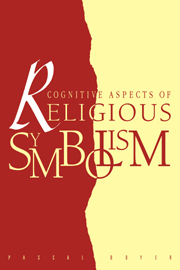Book contents
- Frontmatter
- Contents
- List of contributors
- I Cognitive processes and cultural representations
- II The structure of religious categories
- 3 Computational complexity in the cognitive modelling of cosmological ideas
- 4 ‘Earth’ and ‘path’ as complex categories: semantics and symbolism in Kwaio culture
- 5 Domain-specificity, living kinds and symbolism
- 6 Pseudo-natural kinds
- III Acquisition and belief fixation
- IV The structure of ritual action
- References
- Index of names
- Subject Index
3 - Computational complexity in the cognitive modelling of cosmological ideas
Published online by Cambridge University Press: 05 November 2011
- Frontmatter
- Contents
- List of contributors
- I Cognitive processes and cultural representations
- II The structure of religious categories
- 3 Computational complexity in the cognitive modelling of cosmological ideas
- 4 ‘Earth’ and ‘path’ as complex categories: semantics and symbolism in Kwaio culture
- 5 Domain-specificity, living kinds and symbolism
- 6 Pseudo-natural kinds
- III Acquisition and belief fixation
- IV The structure of ritual action
- References
- Index of names
- Subject Index
Summary
We will focus here on cognitive anthropology's contribution to the study of the representation of complex cultural categories. We will take two metaphysical concepts from Keller's field research in Oceania, which, by intuitive standards, are complex. Using these concepts, we will explore the issues of complexity identified above. The research site is the Polynesian outlier, West Futuna, Vanuatu. The targeted concepts are ones that traditional cognitive anthropology would ordinarily have shelved for attention only after more ‘basic’ conceptual distinctions had been adequately specified.
We will proceed in a manner at many points at odds with traditional cognitive anthropology, although often in line with directions already being taken in contemporary research by some scholars in that field and in cognitive science generally. We proceed in the direction, however, of the sub-discipline's expressed goals of developing a theory of meaning equally applicable to all languages and all cultural contexts. In the concluding section, we will explicate some of these revisions to standard cognitive anthropology and their implications for cognition and theories of concept definition more generally.
Computational complexity
Pinpointing the topic of discussion itself, that is, complexity, is no simple task. Reflections on the literature suggest that complexity might be handled in at least four ways. We discuss this diversity below and take the position that conceptual complexity has to refer to three facets of concept definition: internal representation, conceptual embedding and, derivatively, polysemy. We will specifically exclude issues related to word usage from treatment in this chapter apart from some preliminary discussion.
- Type
- Chapter
- Information
- Cognitive Aspects of Religious Symbolism , pp. 74 - 92Publisher: Cambridge University PressPrint publication year: 1993



